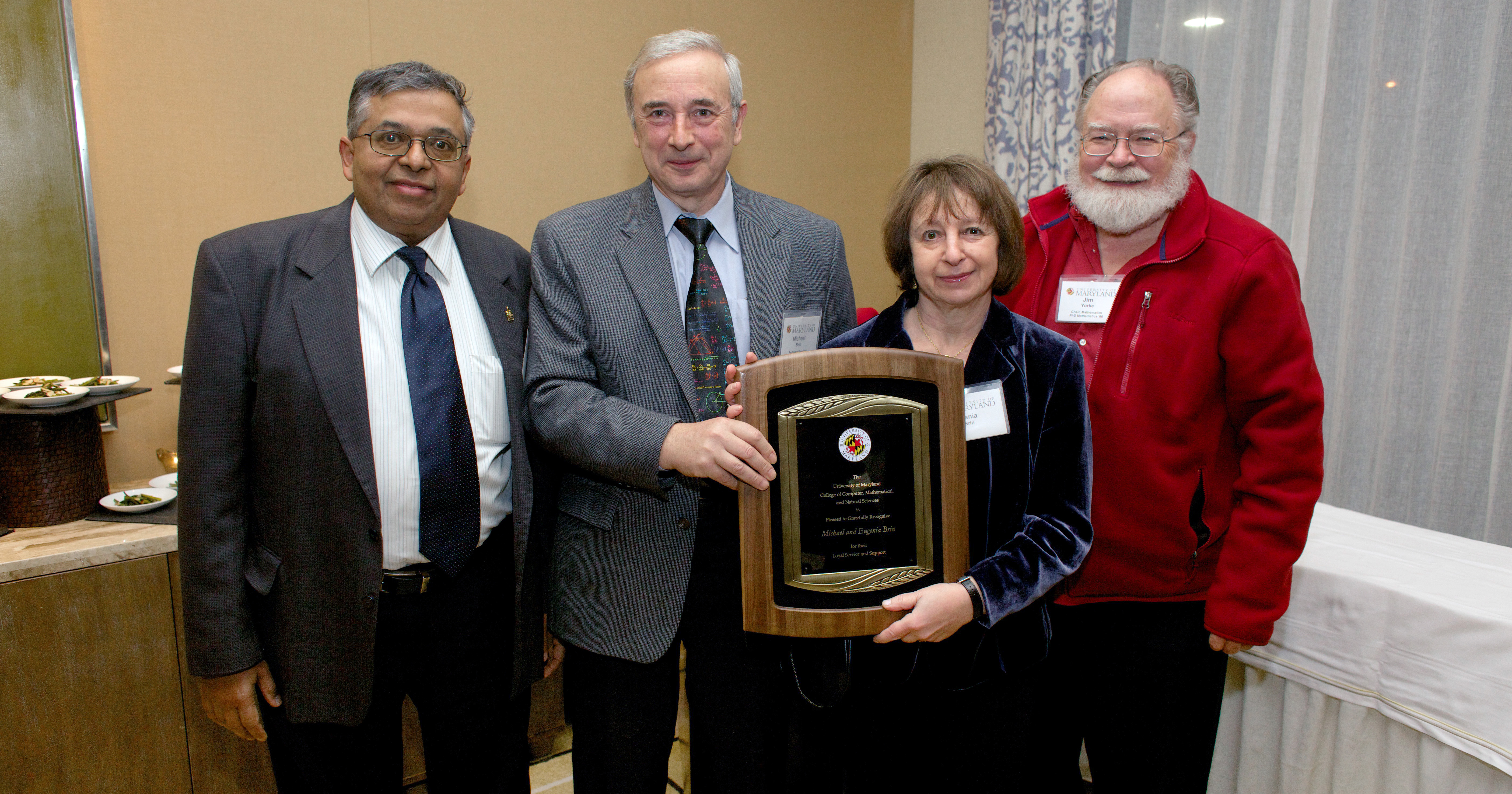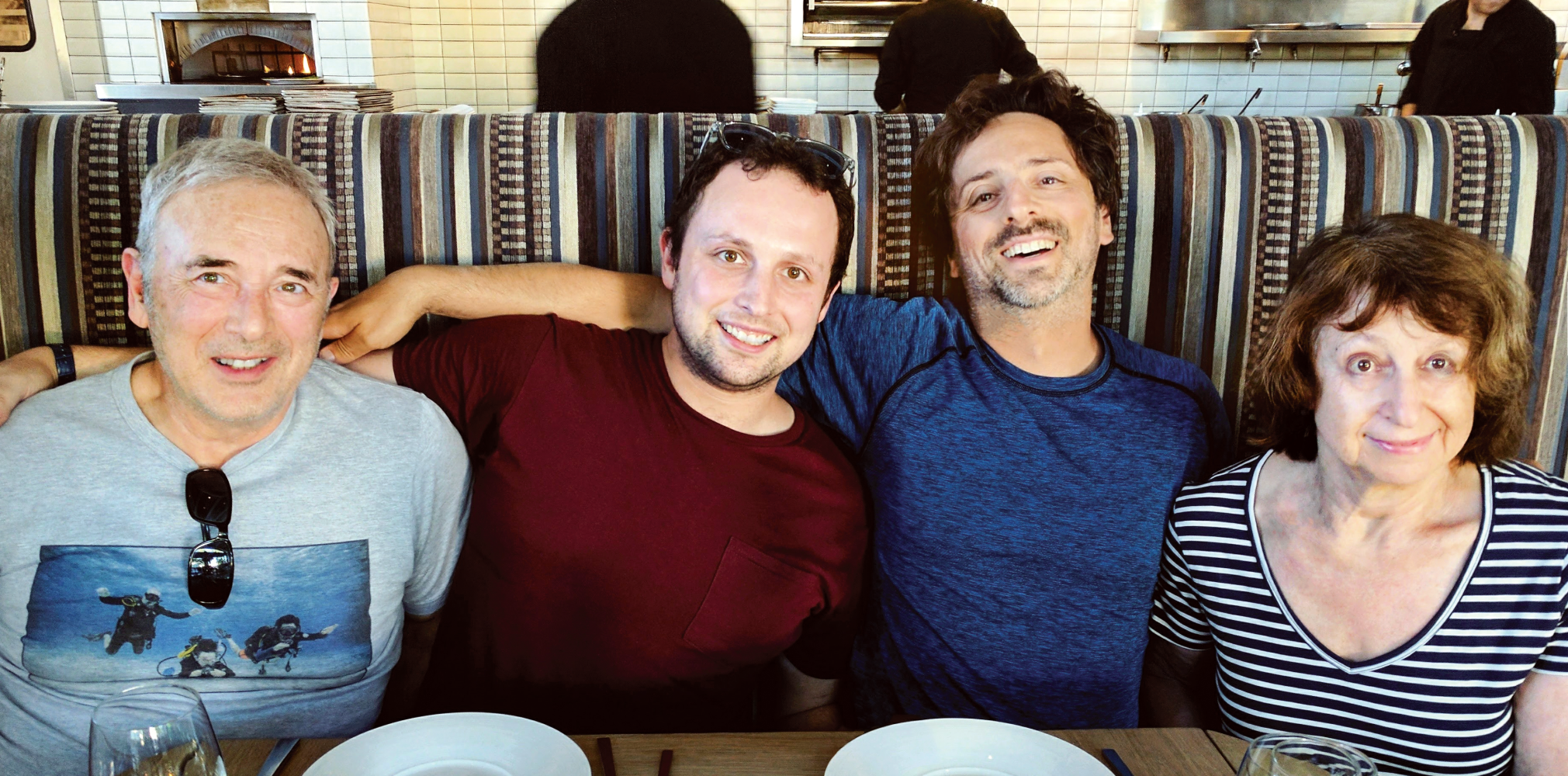Eugenia Brin, a Russian immigrant and retired NASA scientist who, with her family of accomplished Terps, became an important benefactor of the University of Maryland, died on Dec. 3, 2024. She was 76 years old.

Eugenia and her husband, Professor Emeritus of Mathematics Michael Brin, supported projects that reflected their personal journeys and professional passions, donating nearly $57 million to UMD programs in mathematics, computer science, and climate science, Russian studies and the performing arts and the Campus Pantry.
"The generosity of Eugenia Brin and her husband, Michael, has manifested itself in every corner of our campus, from scholarships to program funding to support for research," said UMD President Darryll J. Pines. "She was a beloved member of a storied family of Terps, and we mourn her passing."
The far-reaching impact of the couple, parents to Google co-founder Sergey Brin ’93 and Samuel Brin ’09, on campus spanned establishing 11 new endowed chairs and professorships, the Brin Mathematics Research Center and the Maya Brin Institute for New Performance, faculty residency and fellowship programs, and even a summer math camp for high schoolers.
"Eugenia and Michael Brin's philanthropy has created unprecedented opportunities for faculty members and students in mathematics and computer science at Maryland,” said Amitabh Varshney, dean of the College of Computer, Mathematical, and Natural Sciences (CMNS). “The establishment of the Brin Mathematics Research Center and numerous named chairs and professorships have undoubtedly elevated the reputation of the University of Maryland, where Eugenia will forever be remembered and cherished."
Stephanie Shonekan, dean of the College of Arts and Humanities, said the Brins’ gifts have made a tremendous impact on the arts and humanities at Maryland and particularly on the School of Theatre, Dance, and Performance Studies through their support of the Maya Brin Institute for New Performance.
“We are grateful for their vision and philanthropy that has enabled us to advance creative technologies in artistic performance and attract outstanding faculty and students. Our deep condolences to the entire family,” she said.
Eugenia was born on Aug. 19, 1948, in Moscow. Though she faced discrimination as a Jewish woman in the Soviet Union, she enrolled at Moscow State University’s School of Mechanics and Mathematics. After graduation, she began working in a research lab of the prestigious industrial school, the Soviet Oil and Gas Institute.
In 1978, Michael applied for an exit visa for his family. At the time, doing so was often legally—and sometimes physically—dangerous for Jews in the Soviet Union. Eugenia was forced to resign from her position.
“I lied to all of my coworkers that I was simply leaving my job because I got another job,” Brin told Moment magazine. “I made up—totally made up—the name of a place where I was planning to work.”

The following year, the Brins’ exit visa was granted, and Eugenia, Michael, his mother, Maya, and a young Sergey immigrated to Maryland. Eugenia embarked on a career as a research scientist at NASA’s Goddard Space Flight Center, working on issues related to climate and weather forecasting, while Michael became a professor of mathematics at UMD. (Maya, a former English teacher, also taught Russian at UMD for almost a decade.)
In 1998, Eugenia was diagnosed with Parkinson’s disease at age 50. She and Sergey share a mutation in their LRRK2 gene, the single greatest genetic contributor to Parkinson’s discovered to date. Eugenia joined the Patient Council of the Michael J. Fox Foundation for Parkinson’s Research and became a leading advocate for research on the disease. In 2008, the Brin family established the Eugenia Brin Professorship in Parkinson’s Disease and Movement Disorders at the University of Maryland School of Medicine.
Eugenia also served on the board of the Hebrew Immigration Aid Society, where she was the national chair for myStory, a project dedicated to documenting Jewish immigration to America.
The Brin family has been making gifts to UMD since 2005, starting with an endowed chair in the Department of Mathematics, where Michael worked for 31 years. They later endowed seven additional chairs and professorships in CMNS, including the Eugenia Brin Professorship that supports data assimilation research aimed at improving weather prediction and climate studies.
They also established the Michael Brin Prize in Dynamical Systems, the Brin Postdoctoral Fellowship program and the Michael Brin Graduate Student Endowed Fellowship program, all in mathematics, and the Brin Family Aerial Robotics Lab located in the Brendan Iribe Center for Computer Science and Engineering that provides a flight testing area for drones.
In the College of Arts and Humanities, the couple established the Maya Brin Endowed Professorship in Dance and the Maya Brin Distinguished Lecturer in Russian and created the Maya Brin Residency Program in the School of Languages, Literatures, and Cultures to bring leading cultural figures to campus for short-term stays.
In 2021, they gave $9 million to the university’s School of Theatre, Dance, and Performance Studies to create the Maya Brin Institute for New Performance, in honor of her love of the performing arts. It has added courses, expanded research and funded new teaching positions, undergraduate scholarships, classroom and studio renovations, and instructional technology.
A separate $4.75 million gift that year established the Brin Mathematics Research Center, expanding and spotlighting UMD’s mathematics and statistics research excellence nationally and internationally. The center attracts hundreds of mathematicians to the university every year for workshops, summer schools and distinguished lectures.
The couple endowed the math center in March with a $27.2 million gift that also established two new endowed professorships in mathematics and launched the Brin Maryland Mathematics Camp. It was the fourth-largest outright gift to the university from an individual and the largest ever to the Department of Mathematics.
“The Department of Mathematics is forever indebted to Eugenia and Michael Brin for their generosity and continued support,” said UMD Mathematics Chair and Professor Doron Levy. “We will always cherish Eugenia’s friendship, her inspiring personality and the amazing life she led.”
Brin, who lived in Los Altos Hills, Calif., is survived by her husband of 53 years, Michael, her sons Sergey ’93 and Samuel ’09, and four grandchildren.
Alessio Figalli, Elon Lindenstrauss and Curtis McMullen participated in workshops and gave lectures in the Department of Mathematics.
In fall 2024, three Fields Medalists visited the University of Maryland’s Department of Mathematics.
Elon Lindenstrauss, 2010 Fields Medalist, attended the “Recent Trends in Homogeneous and Teichmuller Dynamics” Workshop at the Brin Mathematics Research Center in September. Lindenstrauss, the Alice Kusiel and Kurt Vorreuter University Chair in the Einstein Institute of Mathematics at the Hebrew University of Jerusalem, studies ergodic theory, dynamical systems and their applications to number theory. Lindenstrauss is also a Professor at the Institute for Advanced Study.
Alessio Figalli, 2018 Fields Medalist, delivered the Douglis Lecture in November. A Chaired Professor of Mathematics at ETH Zürich in Switzerland, Figalli specializes in the wide-ranging fields of calculus of variations and partial differential equations, focusing especially on optimal transport, functional and geometric inequalities, elliptic partial differential equations, and free boundary problems. His work also extends into other areas within both pure and applied mathematics.
Curtis McMullen, 1998 Fields Medalist, delivered the Distinguished Lectures in Geometric Analysis in December on “Entropy: From Algebraic Integers to Dynamics on Complex Surfaces” and “Billiards and Moduli Spaces.” McMullen is the Cabot Professor of Mathematics at Harvard University.
The two-week summer day camp brings strongly motivated high school students to College Park for lectures, problem-solving sessions and more.
Watch the video: https://youtu.be/Iqati_NINmY?si=MG2YeKnlJyohLkl5
-

Meet Brin Mathematics Research Center Coordinator Natalie Kinnear
She grew up in a Terp family and found her way from Los Angeles to College Park in 2018. … Read More -

Keeping an ‘Open Mind’ in Math
As director of UMD’s applied mathematics & statistics, and scientific computation graduate program, Radu Balan oversees many branches of math—and… Read More -

From Math Olympiad to Diplomacy
Math Professor Reimagining Learning: Meet Qendrim Gashi Let’s start by talking about your role in the field of mathematics. Can… Read More
- 1
- 2
- 3
- 4
College Park, MD 20742-4015
P: 301.405.5047 | F: 301.314.0827


